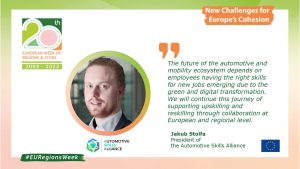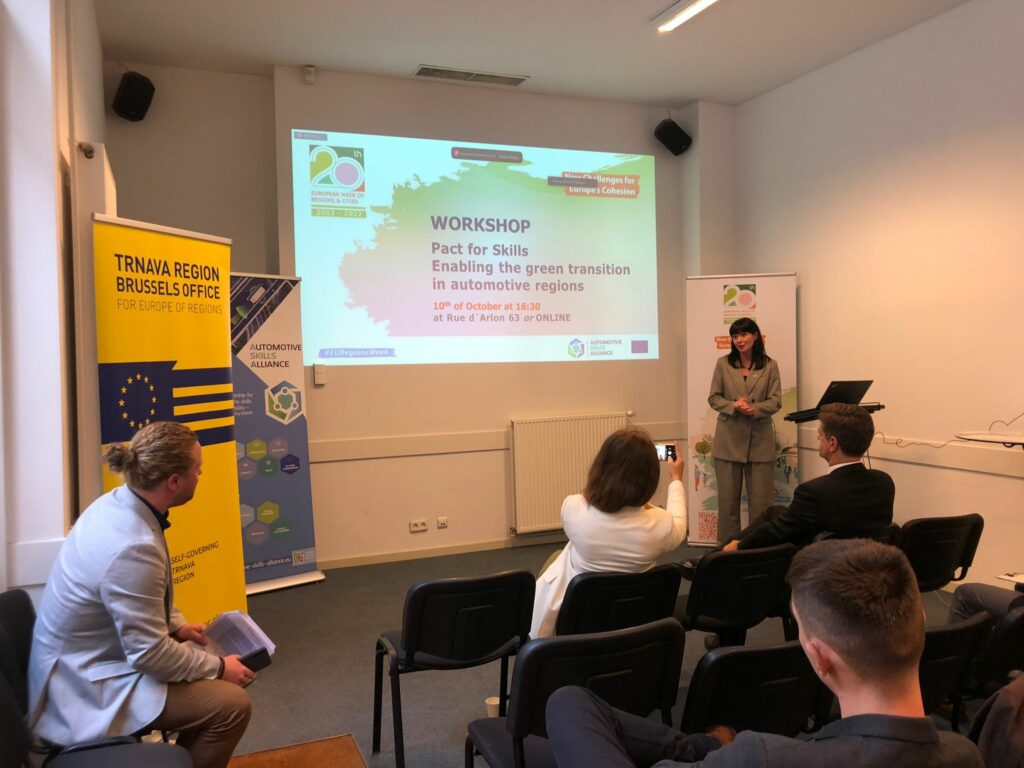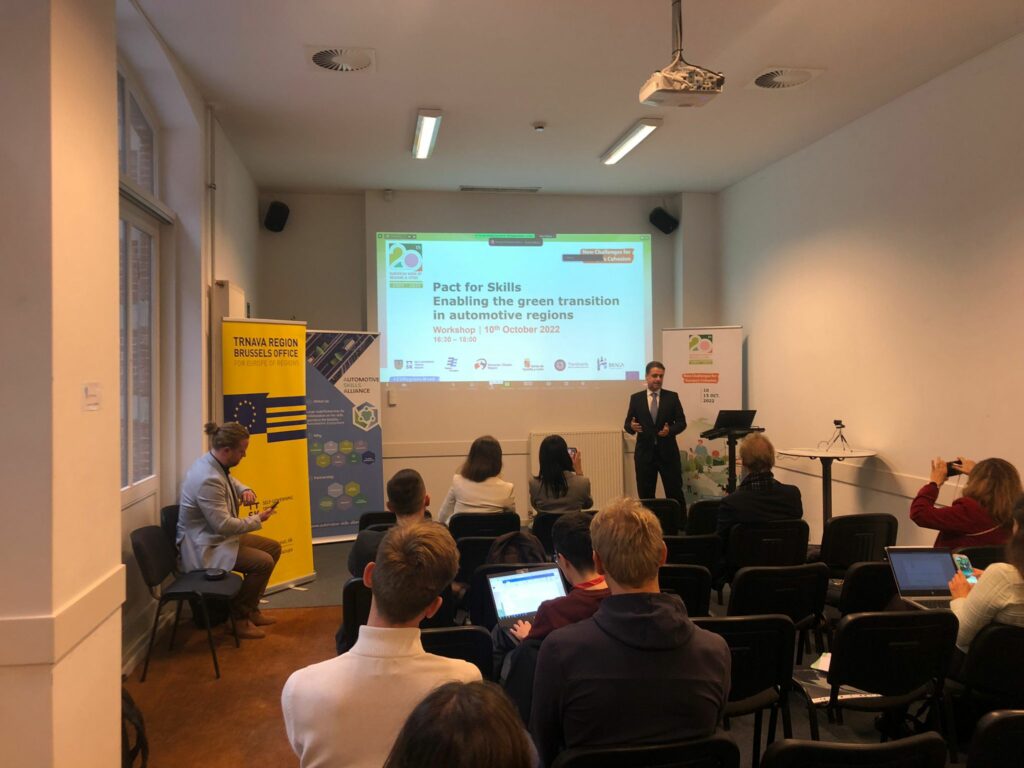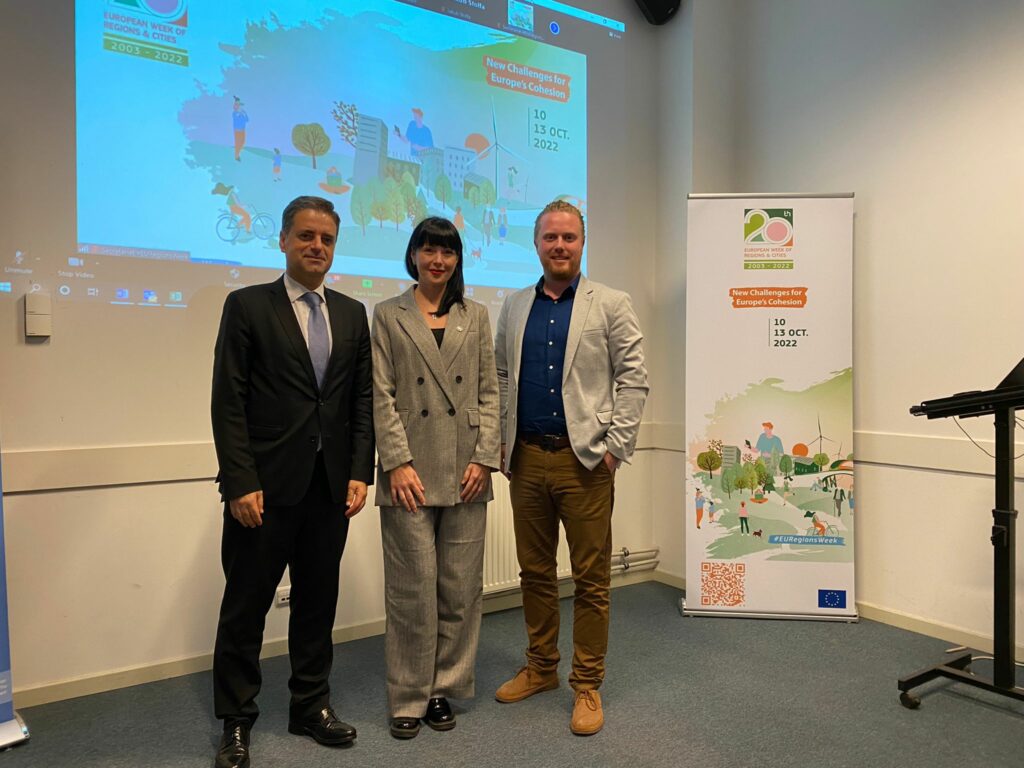Empowering automotive regions through the Pact for Skills – ASA’s contribution to the European Week of Regions and Cities

The importance of professional skills in sustaining the Green Transition in European regions was at the centre of the latest ASA event in Brussels. On October 10th, the Trnava Region Brussels Office hosted a workshop on “Pact for Skills – Enabling the green transition in automotive regions”. The workshop connected professionals from the automotive industry from a diverse network of European local and regional organizations. The workshop was part of a series of insightful events organized within the 20th European Week of Regions and Cities framework.
More and more regions experience a need to anticipate and support the creation of a qualified workforce in the automotive sector. The workshop aimed to bring together regions across the EU to discuss possible solutions to the challenges arising from transformation. Regional partners from around Europe had a chance to draw inspiration from the innovative regional projects involving research & development facilities, education and training providers, businesses, as well as public organizations. The goal uniting them all was the development of specific training programs for the fast-growing technologies in the automotive sector.
The event featured inspiring contributions on the topics of up- and reskilling from several speakers, including Mr. Zdeněk Karásek, regional councillor at Moravia-Silesia and a member of the Council of Regions, Ms. Bianca Muntean, manager and executive director of the Transilvania IT Cluster, Ms. Sabine Stützle-Leinmüler, head of the Skilled Labor Division of the Economic Development of Stuttgart region and Mr. Ricardo Rio, Mayor of Braga and member of the European Committee of the Regions.
The President of ASA, Jakub Štolfa, had the pleasure of moderating the discussion, which has shown once again the power of collaboration in the upskilling and reskilling as part of the Green Transition.
The first speaker, Ms. Bianca Muntean, shared her experience from the Transilvania IT Cluster. “More than 1500 trainees went through the trainings and contributed to the knowledge and competencies in our regions. “Founded nine years ago, our IT cluster turned towards innovation and resource development. It builds its work at the crossroads of the actions of the public administration, universities and industry companies from the IT sector, involving 20.000 developers specialized in providing services for the automotive industry” said Ms. Muntean during the workshop discussion. The trainings brought by the Transilvania IT Cluster are open to partners from Europe. To learn more about possibilities for cooperation, visit the Transilvania IT Cluster website.

The Municipality of Braga, Portugal, is an inspiring example of managing transformation at the local level through European projects. The Mayor, Mr. Rio, explained the roles of companies, innovation centres, universities and local administration in creating an ecosystem of sustainable development in the region. “The Braga municipality managed to reskill workers, export and import skills from the outside, and promote the sustainability of the city of Braga also through programs delivered by the universities in Braga, to support the up-to-date skilling of people living in the region“, said Mr. Rio. Braga’s massive, fast ecosystem transformation is visible in its increased use of electric cars and self-driving vehicles. For a better understanding of the development in Braga, explore their website.

Transformation of the automotive industry is also crucial in German regions, given the importance of the automotive and mobility ecosystem in the country. Ms. Sabine Stützle-Leinmüller enriched the workshop with her 20 years of expertise in the Skilled Labor Division in the Economic Development of Stuttgart Region. “The main goal of our development projects is to connect relevant stakeholders, coordinate networks, provide information and platform for exchange, but also to provide orientation and guidance. This is an integrative approach regarding new technologies, business models, start-up activities, and new skills needed,” explained Ms. Stützle-Leinmüller. The Q-Guide project is just one example of the actions taken that positions the organization as a qualification pilot in the region. It aims to support the target groups of the region in their upskilling/reskilling needs starting from scratch. The site also offers relevant information about communities, funding offers or events available. As a partner of strategic projects, it functions as a bridge between the European and the regional level. At ASA, we aim to build upon this work: facilitating the creation of new initiatives while providing support to the existing ones. We are confident that with this openness and cooperation with our partners, we will be able to find the best solutions to empower regions and people. Get inspired and learn more about this initiative from the website (information available in German only).
The workshop culminated in the contribution of Mr. Zdeněk Karásek, a councillor of the Moravia-Silesia region and a member of the Council of Regions. In his State of Regions and Cities address, the President of the European Committee of the Regions noted: “I am proud of Moravia-Silesia, that is leading the way towards a climate-neutral economy, reskilling 5 000 people“. Mr. Karásek contributed to the workshop by presenting the TRAUTOM project: “Know-how can often be imported from other regions and countries, and such exchanges of best practices leads to collaboration at the European level. Common European projects for building skills will allow timely preparation of people for new technologies”, said Mr. Karásek. The experience showed them the power of cooperation across regions, an insight which was carried over also to the projects ALLBATS and Drives.
We thank the speakers for their insightful contributions. The event highlighted how the Pact for Skills can help regions adapt to arising challenges. We can help people and economies adapt to future needs through effective multi-stakeholder collaboration and innovation support. At ASA, we are excited to support a collective voice of different actors, promoting upskilling and reskilling for a brighter future.
To view the recording of the workshop, click here: https://eu.app.swapcard.com/event/euregionsweek-2022/planning/UGxhbm5pbmdfOTYwNjY5

Source: https://automotive-skills-alliance.eu
Published by CVTI